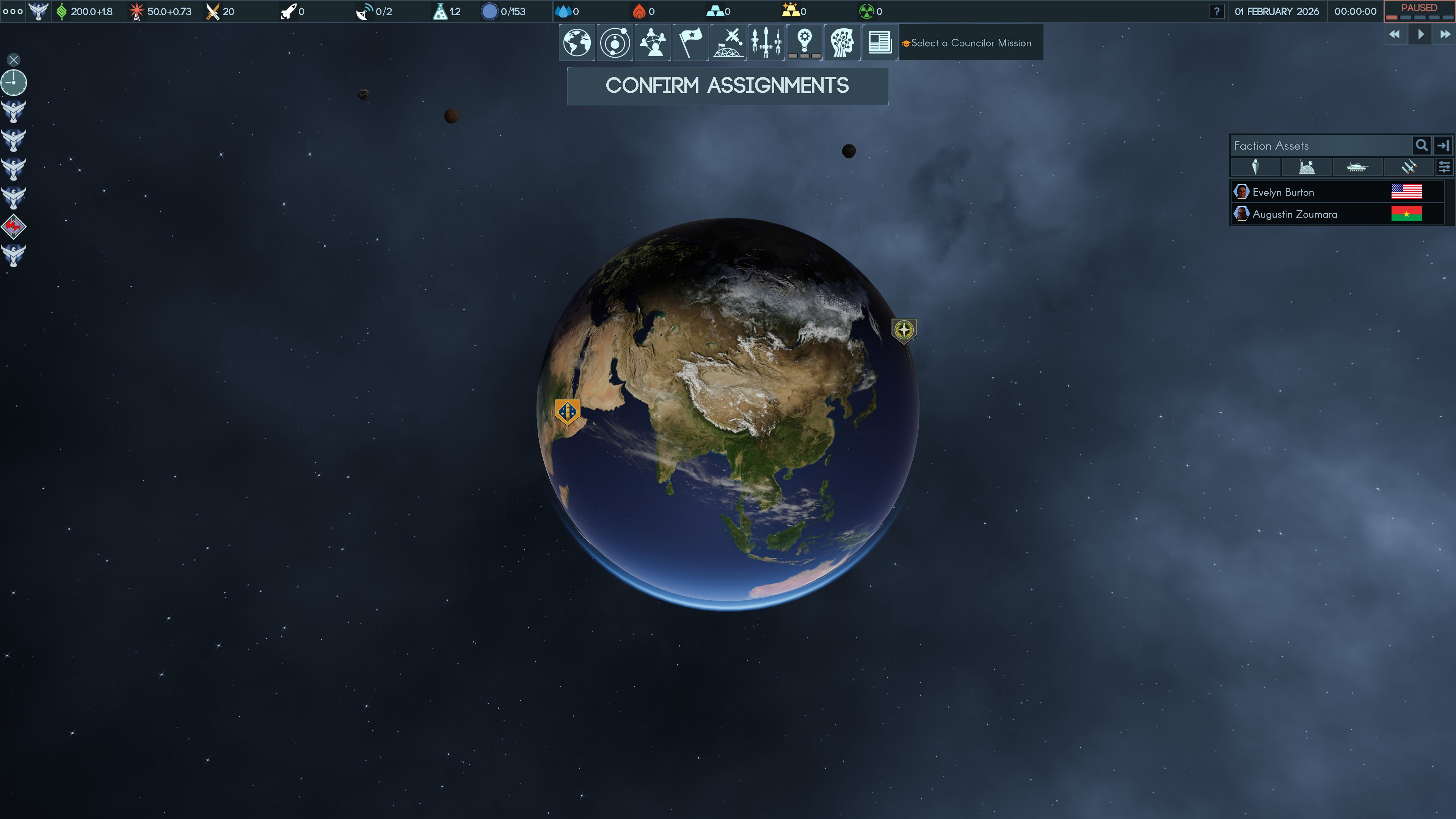Minecraft creators' next project is a strategy game: Scrolls
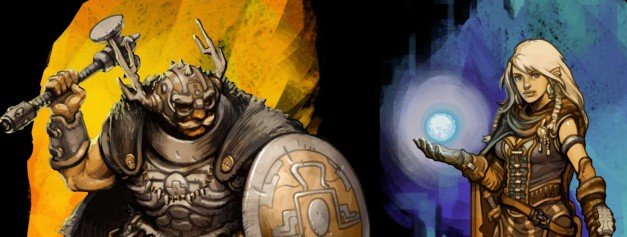
Right now, Minecraft creator Markus Persson is stepping up to a podium at GDC with a URL on his T-shirt: www.scrolls.com . It's the secret next project he and his team at Mojang started when Minecraft suddenly took off, and it could hardly be more different.
It's a single and multiplayer fantasy-themed strategy game that takes the mechanics of collectible card games, but changes what the Mojang guys have always seen as their limitations. Markus' long time friend and the lead designer on Scrolls, Jakob Porser, realises this is going to take people by surprise.
"It's actually been quite interesting to hear the reactions from people in the business when we have presented the idea behind Scrolls. I think the most common question has been. 'But why are you not focusing on making more Minecraft? Like expansions, a sequel or developing the buisness model on the current version?'
"Obviously, that would indeed be the best choice if we were only in it to make money. But we said from the start that the biggest advantage of Minecraft's success is that it enables us to do the projects we really want to do. Scrolls is just that."
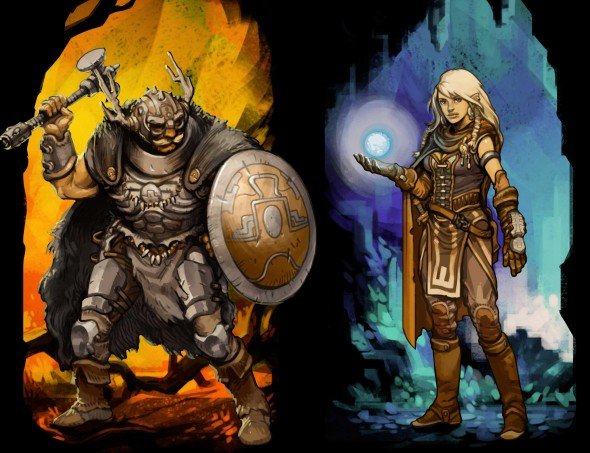
Markus and Jakob have long been fans of collectible card games, but they both had problems with the genre. "We were discussing common gameplay flaws," says Jakob. "The discussion quickly turned to what features would be cool to add to this genre, and before we knew it, the design process of Scrolls had begun."
You play Scrolls online against other players, or offline in a campaign mode. Each player chooses a selection of scrolls, representing creatures, spells and structures under their control, and chooses where to place them on a game board.
"The board is divided so that you control one side each." says Jakob. "As your units attack, they charge across your opponent's side of the board and will damage him unless blocked. As every unit comes with a variety of different abilities, it's not as simple as just placing your units in front of your opponent's to feel safe. You will need to pay close attention to the positioning of you opponents units, siege weapons and building and adjust your strategy according to that."
Keep up to date with the most important stories and the best deals, as picked by the PC Gamer team.
On a broader level, the game is about acquiring those cards: players can buy packs of randomly selected cards for real money, or earn them for free by playing the single player campaign against the AI. Some cards can only be bought, others can only be earned, but all can be traded on the auction house for in-game currency.
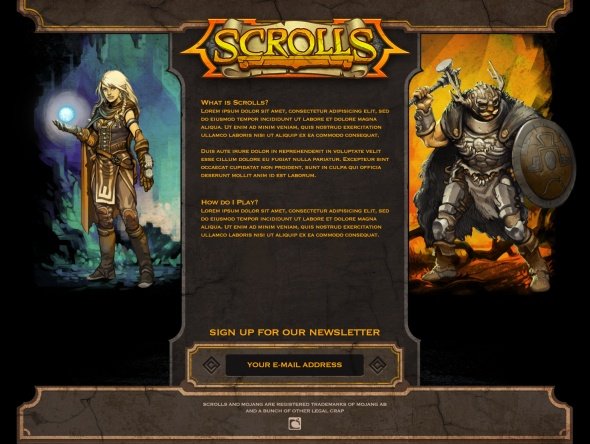
The swords-and-sorcery setting of Scrolls will be fleshed out with a backstory by Jerry Holkins, writer of Penny Arcade - a man with a taste for flowery prose. Jerry says: "Ever since Minecraft took root in the offices, it's transformed once vital staffers into shambling hulks, concerned only with the construction of monolithic structures. When Notch said the Mojang guys had an idea for another game, I decided it would probably be safest just to join them."
I had a few questions about how Scrolls works, and lead designer Jakob was kind enough to answer them.
PC Gamer: You mention Scrolls arose out of you guys talking about some common gameplay flaws in collectible card games - what were they specifically?
Jakob Porser: Although I like many of the elements of random typically used in CCGs, some of them can be annoying and ruin the game. Take resource management for instance. Resources are crucial to be able to play the game at all, and to make acquiring them based on chance can completely ruin a game, if you as a player simply have no chance to counter your opponents attacks. Its one thing to lose a game to a better deck, but to never have the slightest chance of winning because of chance is just bad gameplay.
PC Gamer: What features did you want to add to CCGs?
Jakob Porser: Scrolls features a game board where you place your summoned units. This adds another layer of tactics and opens up for some really interesting design opportunities for the scrolls. To be successful, you will need to pay close attention to the positioning of you opponents units, siege weapons and building and adjust your strategy according to that.
Also, since Scrolls is designed to be played on a computer and not as a paper version, we have the ability to add effects that would be to complicated to keep track of otherwise. For instance, the units in Scrolls does not heal up at the end of your round. Their life pool will diminish as they are being damaged and they will eventually die, unless healed or protected in some other way. Keeping track of that in a paper version would be really hard, but in a computer game where the computer remember this for you, its very much possible.
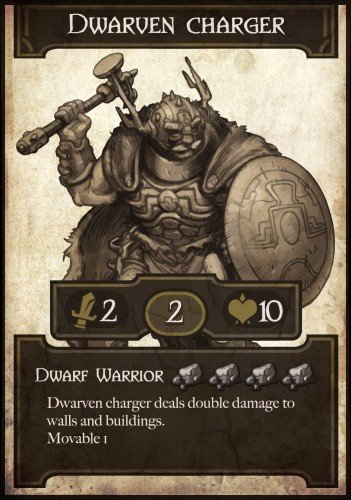
PC Gamer: Do cards represent things that you just deploy and then forget about, or are they like units in a strategy game that you can control after you've placed them?
Jakob Porser: You will certainly have to manage them to get the most out of your gameplay. Some can be moved around the board for instance, and as positioning is such a strong factor, you would be wise to keep an eye on it. Also, units generally carry some special ability - some are passive, others need to be activated - and timing these abilities right are certainly important. However, some things are managed by it self. Say for example that you have a unit that heals itself at the beginning of your round, this would be done automatically.
PC Gamer: Is the game free to play? If not, what kind of price range are you thinking?
Jakob Porser: You acquire scrolls by purchasing spell books which contains a set number of randomly inserted scrolls, but actually doing battle against other opponents is free. In single player you will be able to acquire items and scrolls without purchasing them, so its really up to the player how much they want to spend on the game.
As for the spell books we haven't set a price yet, but expect it to be less then the cost of many other CCGs.
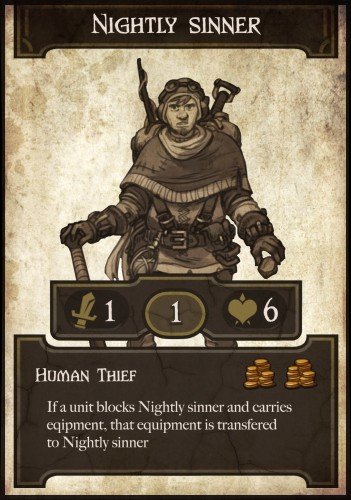
PC Gamer: Will you buy cards for real money?
Jakob Porser: The spell books, which contain scrolls, will be bought with real money, yes.
PC Gamer: Will there be cards that can only be bought with real money, or can you earn them all for free?
Jakob Porser: Some scrolls can only be bought, while other scrolls only can be obtained by playing the single player adventure. However, all scrolls can be bought and sold on an auction house, but that will not be a profit for us, as the profit of a sold scroll goes to the seller. I should probably point out that the currency used for buying and selling on the auction house is an ingame currency that players will not be able to exchange for real money. The ingame currency can also be used to buy new spell books.
PC Gamer: Will you be able to buy and earn specific cards you want, or will you always acquire them in random packs?
Jakob Porser: Well I mentioned the auction house already, as well as being able to acquire scrolls through single player. Apart from that, we are looking into being able to trade cards directly with other players. We are still not sure about this feature, as it would probably attract evil minded people who want to hack other players accounts and steal their collection of scrolls, but if we can come up with a smart solution for this, we will definitely implement it.
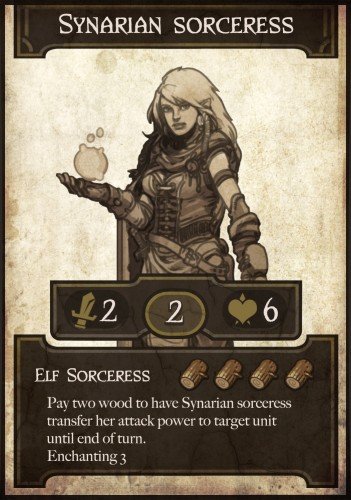
PC Gamer: Can you give an example of the kind of thing a card might do?
Jakob Porser: In the prototype, we had a unit that over time could grow very powerful, but a side effect to boosting its power was that you also increased the time until its would attack. On its own, this unit was quite harmless to the opponent. Sure it got very powerful, but as it never got to attack you couldn't utilize its power. That is unless you placed it next to another unit who's ability was that once it attacked, every unit next to it also attacked. Combining these units made for some awesome humiliation. (Notch was close to rage quit, and obviously I was mocking him to the best of my ability)
PC Gamer: Will there be different races or decks, or will all players take cards from the same pool?
Jakob Porser: You will take scrolls from the same pool, but the resource type used to play scrolls variate. It will be very hard to successfully play a deck that uses more then two different resource types. Possible, but hard.
PC Gamer: Is the game played on an abstract board or does it take place on maps that represent places?
Jakob Porser: It will be an abstract board.
PC Gamer: Presumably in multiplayer you and your opponent are on equal footing. Is that also the case with you and the AI in single player?
Jakob Porser: Single player will differ. Sometimes matches will be similar to facing another player only your opponent is computer controlled, but sometimes you will face a large creature with special abilities that doesn't resemble anything you would see in a multiplayer game. The single player part is very flexible that way and a lot of fun to design. For example, some bosses will require the player to apply tactics they would never think of doing when facing another player.
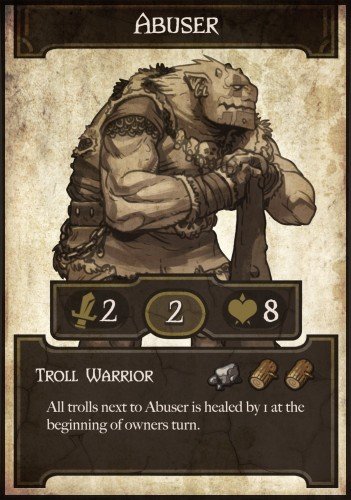
We're all intrigued to see how this works out. It's such a clean break from their current game that there's no guarantee Minecraft fans will go for it, but Mojang do have a rare knack for fun. Jakob says, "I don't believe that gamers are so one dimensional that they only enjoy a certain genre. I myself love everything from platform games to MMORPGs, and I dont think I am that uncommon."

